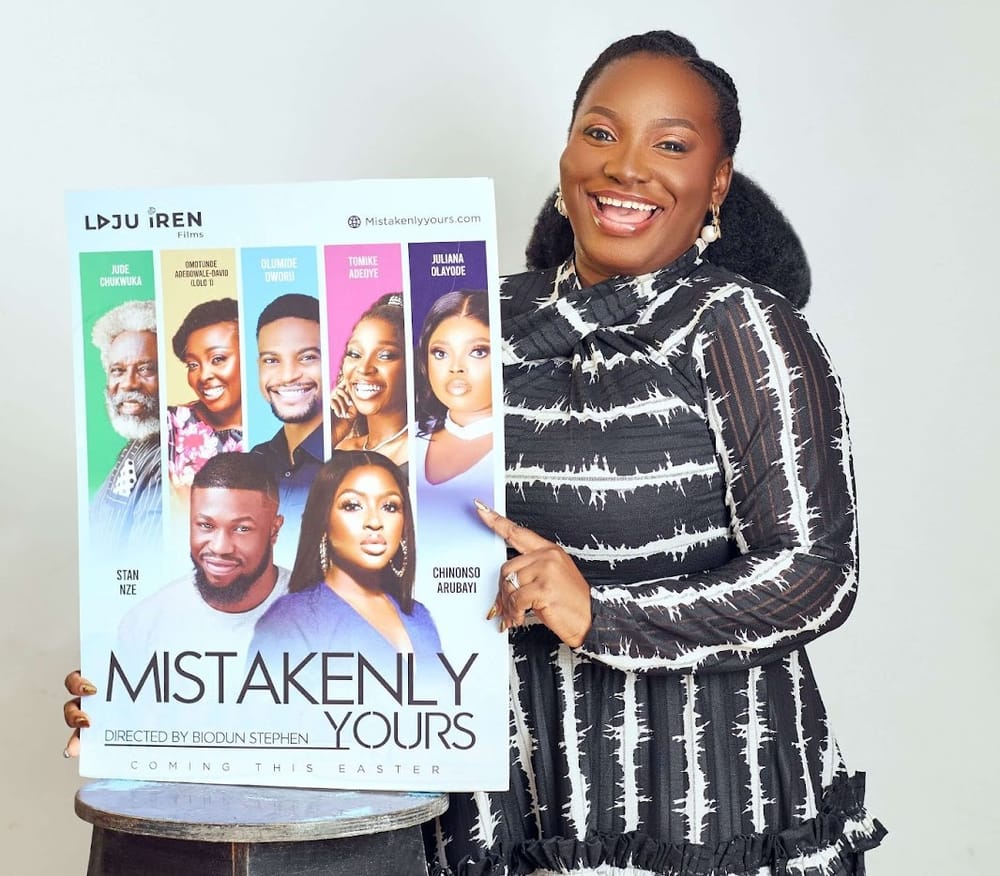Every year, the Nigerian movie industry (Nollywood) produces over 2,000 movies, making it the world’s second-largest film industry by output. In the past three years, major streaming platforms like Netflix and Amazon have presented a new option for Nollywood movie makers, helping them reach a global audience and earn a sizable financial reward.
But even at that, “there are more filmmakers and movies than streaming platforms can pay for and cinemas can show,” says Laju Iren, an independent filmmaker and accomplished author.
Only a select few Nigerian films make it to cinemas and streaming services, the most lucrative avenues for filmmakers. The rest end up on television stations or free platforms like YouTube, significantly limiting their financial potential. Compounding this challenge is the ongoing issue of movie piracy.
This stark reality propelled Iren to look inward and rethink how she could profitably distribute her movies, resulting in the idea of a virtual cinema premiere. In this interview, Iren talks about how the idea came about and her journey in pioneering a different approach to distributing movies.
This interview has been edited for clarity and brevity.
Take me back to the first time the idea of a virtual cinema struck you
In January 2021, I had just made my first movie Loving Amanda and it was taking a long time for the streaming platforms to get back to us. During a conversation with my husband, the issue came up and he chipped in that we can find a way to distribute this on our own and it will work out.
In response to that, the first idea that came to mind was to do a physical premier but when I did the calculation for that it didn’t make sense because we were going to run at a loss. At that time, it was my most expensive film and I needed to make a profit so that I’d be able to make another one.
The next option was to create an online subscription model service but that would have been too expensive. So I thought about it, prayed a little and the idea of virtual premier popped into my mind.
Hmmm. What’s different about this virtual cinema approach?
I’d say it’s a hybrid between the physical cinema experience and the online subscription model. People pay to see the movie online for a limited stipulated time. For example, my latest movie Mistakenly Yours will be showing from Easter Friday to Easter Monday (March 29 – April 1, 2024). When people buy a ticket, they get an email with personalised details to watch it online.
Many times when movie makers want to innovate they start with an online subscription-based approach. Filmmakers often say they’re doing it like Netflix. But the problem with that is that not everybody has the resources to keep the required infrastructure (cloud storage and app) up and running around the clock. Also, you need to keep creating content to satisfy and retain subscribers.
This is evident in the fact that many people have tried to do the online subscription-based model but have failed. For traditional cinemas, it’s dependent on location, meaning you can’t watch the movie if you’re not in the location. For example, if an up-and-coming movie has more fans abroad, it might be difficult for them to watch it.
We are trying to democratise movie distribution beyond the regular distribution options: cinemas, streaming platforms, DSTV, online subscription-based models, and free-to-air platforms like YouTube. There are also not many options in the filmmaking industry where people are paying directly to the filmmaker.
Even though our first movie Loving Amanda ended up going to Amazon Prime, it was good to have made some returns from the virtual cinema premiere.
Sounds Great! What inspired you to think outside the box and develop this novel approach?
I saw a need for it. Being relatively new to the industry, I look at challenges with a fresh perspective. Before I became a filmmaker I was an author, it was that same approach I took as a self-published author to relate with my audience one-on-one; keeping them as part of my journey while selling books to them.
I talk a lot about telling stories about your story. Whatever I do, my audience is always directly involved in one way or the other. I had done something similar with selling books and courses and I felt that it would work with movies. I’m glad it did.
How has it been piloting this idea for two movies: Loving Amanda and now Mistakenly Yours?
It’s been a rewarding experience. I’m fortunate to have an audience that picks up what I do and organically tries to promote it.
One thing I’m learning as a filmmaker is that you can’t just be a filmmaker, at least not in Nigeria. You have to wear different hats, understand the business and take calculated risks.
The movie-making process is a long one where I have to wear my hat as a writer and a producer – an executive producer trying to get funding for the movie. Then putting out fires when we’re in production and also market the movie.
It’s a lot but I’m thankful for having a great team. The fact that I love what I do also makes it more rewarding because the stories we tell need to be told. We must pay as much attention to distributing these stories as we did to telling them in the first place because no one lights a candle and puts it under a bushel.
Mistakenly Yours is a movie with a bigger budget, as such we’ve improved our processes based on some lessons we learnt from the last premiere of Loving Amanda. From Loving Amanda we made about ₦12 million ($20,000)* and for Mistakenly Yours we’re well on our way to doubling that — currently at ₦20 million ($13,333)*.
We initially set a target of 50,000 ticket sales. While we’ve only reached about 10% of that goal so far, we’re encouraged by the progress. It’s a significant improvement from where we began, which was with zero sales.
We also think the extensive publicity and advertising that we’ve done would serve as a good foundation for when Mistakenly Yours hits the streaming platforms later. This virtual premiere is just the beginning – the film has a bright future beyond this initial event.

What are the biggest challenges you’ve faced in implementing this innovation?
Pulling off this virtual premiere involved integrating various technologies. We juggled different platforms for payments, landing pages, and secure streaming (DRM-protected to prevent piracy, as we plan to distribute the movie elsewhere later). Throughout this process, we had to constantly customise the tech stack to fit our needs and those of our audience.
The current economic climate makes sales tough, but I’m always happy to put in the effort. People are facing challenges, even though some are fortunate to be financially stable. In all, I’m incredibly grateful for the progress we’ve made and the outpouring of support from our audience.
How do you see this innovation impacting the future of movie streaming
I hope that more people see what we’re doing and emulate it, especially people who tell the type of stories that we do. There are more film-makers than streaming platforms or TV stations and not everyone gets a good enough return on investment on free-to-air platforms like YouTube.
For a Christian filmmaker like myself, I think it’s important to continually empower ourselves to not just tell one story and stop there. Financial sustainability is key. By achieving profitability, we can create more content the world needs. I hope it further democratises movie distribution and opens more doors for us at Laju Iren Films and also other filmmakers.
As filmmakers, we need to continue to find other avenues to serve our audience in productive ways.
*Exchange rate:
2021: ₦600/$1
2024: ₦1,500/$1
Get passive updates on African tech & startups
View and choose the stories to interact with on our WhatsApp Channel
Explore





